|
|
|
Sort Order |
|
|
|
Items / Page
|
|
|
|
|
|
|
| Srl | Item |
| 1 |
ID:
178681
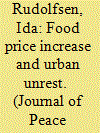

|
|
|
|
|
| Summary/Abstract |
Under what conditions do increasing food prices lead to urban unrest? Existing literature suggests a positive correlation between food prices and social unrest. Meanwhile, there is a large variation in the consequences of increasing food prices, indicating that this phenomenon has a heterogeneous effect across different contexts. The theoretical focus on grievances in the existing literature appears to be insufficient for explaining the variations in outcome. This study asks whether specific features in the domestic institutional setting can explain why food-price induced grievances sometimes lead to unrest and at other times do not. Specifically, the article argues that the manifestation of unrest when food prices increase is moderated by the degree to which the state represses societal organizations. Civil and political society have the potential to channel collective dissent around food-related grievances, as these organizations provide existing mobilization structures that people can draw on to engage in collective action. Further, they can translate an individual-level grievance into a group phenomenon by politicizing the cost of food through the formulation of grievance frames. If the state represses existing societal organizations that can help aggrieved individuals engage in collective action to voice discontent – or introduces barriers to initial mobilization – this will likely reduce the possibility of unrest when food prices go up. Using institutional data from the Varieties of Democracy (V-Dem) project combined with the Social Conflict Analysis Database (SCAD), the findings suggest that repression of societal organizations decreases the likelihood of unrest when food prices rise.
|
|
|
|
|
|
|
|
|
|
|
|
|
|
|
|
| 2 |
ID:
178686
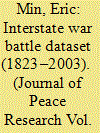

|
|
|
|
|
| Summary/Abstract |
Extant scholarship on interstate war and conflict resolution predominantly utilizes formal models, case studies, and statistical models with wars as the unit of analysis to assess the impact of battlefield activity on war duration and termination. As such, longstanding views of war have not been tested systematically using intraconflict measures, and deeper studies of war dynamics have also been hampered. I address these gaps by creating and introducing the Interstate War Battle (IWB) dataset, which captures the outcomes and dates of 1,708 battles across 97 interstate wars since 1823. This article describes the sources used to create these data, provides definitions, and presents descriptive statistics for the basic battle data and several daily-level measures constructed from them. I then use the data to test the implications of two major theoretical perspectives on conflict termination: the informational view, which emphasizes convergence in beliefs through battlefield activity; and Zartman’s ripeness theory, which highlights costly stalemates in fighting. I find suggestive evidence for informational views and little support for ripeness theory: new battlefield outcomes promote negotiated settlements, while battlefield stagnation undermines them. The IWB dataset has significant implications, highlights future research topics, and motivates a renewed research agenda on the empirical study of conflict.
|
|
|
|
|
|
|
|
|
|
|
|
|
|
|
|
| 3 |
ID:
178688
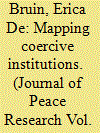

|
|
|
|
|
| Summary/Abstract |
How rulers organize and use their security forces is thought to have important implications for regime survival, repression, and military effectiveness. While a number of studies provide insight into the coercive institutions of individual states, efforts to understand systematic patterns have been hampered by a lack of reliable data on state security forces that can be compared across states and within them over time. This article presents the State Security Forces (SSF) dataset, which includes 375 security forces in 110 countries, 1960–2010. It tracks how each force is commanded, staffed, equipped, and deployed, as well as the number of security forces and potential counterweights in each state’s security sector as a whole. After illustrating how the SSF dataset differs from related ones and presenting descriptive trends, the article shows how it can be used to deepen our understanding of coup-proofing and strategic substitution, and identifies additional research uses of the dataset.
|
|
|
|
|
|
|
|
|
|
|
|
|
|
|
|
| 4 |
ID:
178685
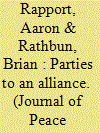

|
|
|
|
|
| Summary/Abstract |
While much research has been done on the domestic determinants of alliance institutionalization, there has been a neglect of the effect of domestic politics, by which we mean contestation between political actors in the same country. We hypothesize that the ideology of the parties governing countries negotiating the terms of security relationships will affect their preferences over the degree and kind of institutionalization seen in alliances. Drawing on previous literature, we argue that rightist parties are more sensitive to sovereignty costs and will therefore insist on maintaining more control over policy than their leftist counterparts. They can assert control either by imposing hierarchical forms of institutionalization when they are a stronger party to an alliance or by avoiding institutionalization altogether if they are the weaker party in an alliance. In contrast, we expect leftist parties to be less sensitive to sovereignty costs and generally favorable to more voice-driven, egalitarian institutions that have institutionalized mechanisms for consensus-building, regardless of their country’s relative power position. Combining the ATOP dataset on alliance design with the Parties Manifesto Project, we find broad support for our hypotheses. Our findings indicate that scholars should pay more attention to the internal ideological contestation within countries, making room for domestic political factors that go beyond regime type.
|
|
|
|
|
|
|
|
|
|
|
|
|
|
|
|
| 5 |
ID:
178687


|
|
|
|
|
| Summary/Abstract |
This article introduces the Peaceful Resolution of Territorial Disputes (PRTD) dataset, covering all interstate territorial disputes (1945–2015). Our dataset captures proposals for the peaceful resolution of territorial disputes made by states involved in territorial claims at the disputant-year level. These proposals provide a concrete measure of changing state preferences toward negotiations, non-binding, and binding third-party dispute resolution methods over time. In contrast to existing attempt-level data, the monadic panel design of the dataset captures not only actual attempts at peaceful resolution – the result of an agreement between disputants – but also proposals for methods that did not occur but were preferred at a particular time point. Our dataset allows for robust and generalizable quantitative analyses of the peaceful resolution of territorial disputes that are sensitive to temporal, regional, claim-based, and state-level trends. To demonstrate the utility of our dataset, we use hybrid logistic regression to examine the determinants of binding PRTD proposals. Over-time changes in characteristics such as regime type and treaty commitments influence attitudes toward binding settlement methods differently than disputant-level measurements. We also show that time has a distinctively non-linear effect.
|
|
|
|
|
|
|
|
|
|
|
|
|
|
|
|
| 6 |
ID:
178680
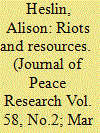

|
|
|
|
|
| Summary/Abstract |
How does food access affect the mobilization of collective violence? The upsurge in rioting in 2008 drew broad attention to the relationship of food and conflict, as scholars and policymakers sought to understand the mobilization and variation of rioting events. Studies have shown a robust relationship between conflict and food prices, noting an increase in incidents of violent conflict during times of high global prices. This study furthers the theory on the role of food access in riot mobilization, investigating the mechanisms by which changes in food access translate into collective violence. Using detailed, first-hand accounts of rioting in 2007 and 2008, this study investigates the motives and grievances of the community members where riots occurred and the relationship of those grievances to food access, while contrasting these accounts to communities that did not engage in rioting. In the cases presented, a change in food access motivated protest and violence involving existing grievances rather than explicitly addressing food access. In this way, food changed the meaning and severity of existing grievances. The cases studied add to our understanding of concurrent upsurges in food riots by outlining the ways that food access interacts with local contexts to initiate violent conflict, stressing the presence of existing actors who use decreased food access to mobilize resources to address existing grievances. While media accounts highlighted food access as the primary concern of food rioters, this study argues that many ‘food riots’ were not, in fact, directly motivated by food access. Rather, changes to food access can aid in mobilizing protests around a range of grievances, some unrelated to food access. Efforts to address the causes of food-related instability will be unsuccessful if they focus solely on food access without addressing the primary motivating grievance and understanding how food access relates to that grievance.
|
|
|
|
|
|
|
|
|
|
|
|
|
|
|
|
| 7 |
ID:
178684
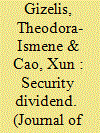

|
|
|
|
|
| Summary/Abstract |
United Nations Security Council Resolution 1325 highlights the distinct needs of women in security and well-being. Few studies explore how peacekeeping affects women’s access to health and education. Yet, women’s access to public services such as health is a form of gender inequality in post-conflict countries leading to unbalanced distribution of resources. We argue that peacekeeping operations (PKOs) have both a direct and an important indirect impact on maternal health and women’s well-being. First, peacekeeping can have a direct effect by providing medical and training facilities. Second, peacekeeping has an indirect effect as improvement in the overall level of security facilitates women’s access to medical services and education. We evaluate our argument by combining evidence from different levels of analysis. First, we use a difference-in-difference analysis of 45 African countries with data between 1990 and 2013, comparing the changes in maternal mortality rates (MMR) for countries with and without PKOs. Second, we look at within-country variations across areas with and without UN peacekeeping deployment in three countries with integrative PKOs, combining geo-coded peacekeeping data with individual data on maternal health and education from the Demographic and Health Surveys (DHS) in the Democratic Republic of Congo, Côte D’Ivoire, and Liberia. We find strong empirical support for a positive relationship between peacekeeping presence and maternal health outcomes and access to services.
|
|
|
|
|
|
|
|
|
|
|
|
|
|
|
|
| 8 |
ID:
178682


|
|
|
|
|
| Summary/Abstract |
Pre-negotiation is widely accepted as a means to convince intrastate conflict parties to negotiate formally; however, research has not yet established a causal link between early efforts to bring warring parties together and the outcome of any negotiated settlement. This gap begs the question: To what extent do activities during the pre-negotiation phase contribute to the signing of a peace agreement? Theory on interstate conflict suggests that pre-negotiation reduces risk, thereby convincing conflict parties that they have more to gain from negotiating than from fighting. However, in conflicts between governments and non-state armed actors, this article argues that reciprocity paves the way for reaching peace agreements. This article introduces a new dataset on pre-negotiation including nearly all intrastate armed conflicts between 2005 and 2015. Confirming previous findings, mediation is significantly and positively correlated with reaching a type of peace agreement; conflicts over government are more likely to end in a negotiated agreement than conflicts over territory or both government and territory. In contrast to existing qualitative research, this study finds little evidence that pre-negotiation increases the likelihood that conflict dyads sign peace agreements. Future quantitative research on this topic requires more nuanced measures of the conditions under which conflict parties shift from unilateral to joint decisionmaking.
|
|
|
|
|
|
|
|
|
|
|
|
|
|
|
|
| 9 |
ID:
178683


|
|
|
|
|
| Summary/Abstract |
Why do former belligerents institutionalize power-sharing arrangements after a civil war ends? The choice of power-sharing institutions shapes the nature of governance in many post-conflict settings. A better understanding of how belligerents come to choose institutionalized forms of power-sharing would thus help us explain how belligerents come to make a seemingly simple institutional choice that may have immense consequences. Existing scholarship emphasizes the nature of the conflict preceding negotiations, international actors, or state institutional capacity as critical factors for determining whether former belligerents will agree to share power or not. Yet these accounts overlook the importance of political considerations between and within ethnic groups. This article argues that elites create power-sharing institutions when the most significant threat to their political power comes from an outside group as opposed to from within their own group. That is, forward-looking and power-minded leaders of former belligerents push for the type of power-sharing at the negotiating table that affords them the greatest opportunity to influence country-level politics after the conflict has concluded in full. For elites facing competition from outside, this means securing power-sharing through institutional rules and guidelines in the settlement of the civil war to ensure that they are included in the governance of the state. By contrast, for elites fearing in-group rivals, complex governance institutions are at best unnecessary and, at worst, a significant concession to weaker opponents. I test the argument with a cross-national analysis of an original dataset of 186 power-sharing negotiations from 1945–2011. The empirical analysis suggests that elites are most likely to institutionalize power-sharing when no single ethnic group dominates politics and when most ethnic groups are unified. The quantitative analysis is complemented with illustrative examples from cases of power-sharing negotiations that offer insight into the proposed theoretical mechanisms.
|
|
|
|
|
|
|
|
|
|
|
|
|
|
|
|
|
|
|
|
|